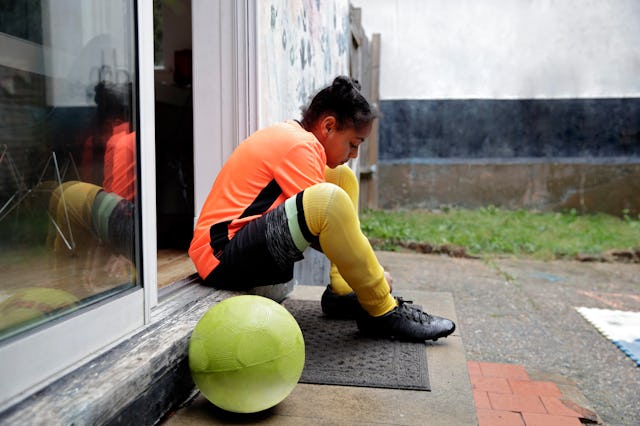How To Steer Your Kid Away From A Sport You Don't Want Them To Play

It’s a tale as old as time: Your kid is dying to play a sport that you’re against, like football or hockey. Personally, I’d rather my sons be heavily invested in chess club or the thespian society, but the oldest plays varsity soccer and my youngest is eyeball-deep in tae kwon do. So I get it. I’m not a fan of their chosen sports.
It’s not that I’m against them being involved in team sports; it’s that I worry about their little brains getting repeatedly rattled and their teeth being accidentally kicked out. So what happens if your kid really, really, really wants to play a sport you don’t want them playing? Here’s how you can (try to) sway them in a different direction.
Do Not Encourage Your Child To Specialize At A Young Age
Let’s assume that your child is already playing flag football. The last thing you want to do is narrow their playing field (get it??!) to prioritize flag above all other sports options. Sure, your child may be “gifted”— but specializing almost assures that they will eventually graduate to the world of bone-crushing tackle football. It’s also good to keep the mind what Tory Lindly, president of the National Athletic Trainers’ Association, told The New York Times: “Single-sports specialization is bordering on an epidemic in terms of the risks it can pose, for physical injuries as well as the potential for negative psychological effects.”
Steer Them Toward Another Sport—And Make Sure They Have Fun!
Of course, kids’ involvement in sports is a great way for them to stay physically, psychosocially, and mentally healthy. Luckily, there are plenty of minimal-contact sports out there, so a parent should aim to sniff those out, nudge their young athlete in that direction, and keep them there.
How do we do that? Very simply, we try to assure that they are having a good time—because 70% of our kids abandon a particular sport because it’s not fun. A 2019 George Washington University study asked athletes to define “fun.” “Trying your best,” “exercising and being active” and “getting along with your teammates” topped their definitions list. Tellingly, “winning” ranked much lower on the fun-o-meter. Food for thought.
If you ask clinical neuropsychologist William Stixrud, parents should give their children “as much autonomy as possible,” while still setting reasonable parameters. So for me, taking flag or tackle football off the table is a fair parameter.
What’s your no-go sport?